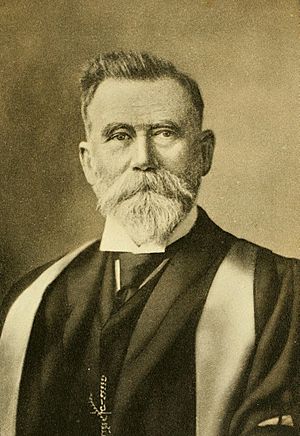Robert Bell (geologist) facts for kids
Quick facts for kids
Robert Bell
|
|
|---|---|
 |
|
| Born | June 3, 1841 |
| Died | June 18, 1917 (aged 76) |
| Nationality | Canadian |
| Education | |
| Known for | named over 3,000 geographical features |
| Awards | King's Gold Medal of the Royal Geographical Society of London Cullum Geographical Medal of the American Geographical Society of New York |
| Scientific career | |
| Fields | Geology |
| Institutions | Geological Survey of Canada |
Robert Bell ISO FRSC (June 3, 1841 – June 18, 1917) was a famous Canadian geologist, professor, and government worker. A geologist studies the Earth's rocks, minerals, and landforms. Bell is known as one of Canada's greatest exploring scientists. He explored vast areas and gave names to over 3,000 places across Canada.
Contents
Who Was Robert Bell?
Robert Bell was born in Toronto, Upper Canada (which is now part of Ontario). His father, Reverend Andrew Bell, was a minister and also enjoyed studying geology. In 1873, Robert Bell married Agnes Smith. They had four children: one son and three daughters. He spent his later years in Ottawa and on his farm in Rathwell, Manitoba. Robert Bell passed away at his farm when he was 76 years old.
His Early Life and Education
Robert Bell started his amazing career very young. In 1856, when he was just 15, he worked as a summer helper for William Edmond Logan. Logan was part of the Geological Survey of Canada (GSC). The GSC is a government group that studies Canada's land.
Even while he was studying at university, Bell kept working with the GSC during his summers. By 1859, he was leading his own survey team. Bell went to McGill University in Montreal. He studied civil engineering and graduated in 1861 with a special medal. He then studied for two years at the University of Edinburgh in Scotland. Later, in 1878, he also earned a medical degree from McGill University.
Exploring Canada: Robert Bell's Career
In 1863, Bell became a professor at Queen’s College in Kingston, Ontario. He taught chemistry and natural sciences. But he still loved doing fieldwork for the GSC in the summers. In 1867, he left Queen's University to work for the GSC full-time.
By 1869, Bell became a permanent officer at the GSC. He spent the rest of his career there. He was promoted several times, becoming Assistant Director in 1877 and Chief Geologist in 1890. From 1901 to 1906, he was the Acting Director. He retired in 1908 after a long and successful career.
Mapping New Lands
During his 52 years with the GSC, Robert Bell led many big explorations. He traveled through northern Quebec, Ontario, Manitoba, and the eastern Arctic. He also explored the prairies of Saskatchewan and the Athabasca oil sands. He is famous for mapping the rivers between Hudson Bay and Lake Superior. This work was very important for understanding Canada's geography.
Naming Places and Writing Reports
Like other GSC geologists, Bell collected many things. He gathered rock samples and took notes on geology, plants, animals, and local Indigenous groups. He also wrote about the climate and natural resources. His colleagues at the GSC called him the "father of Canadian place-names." This is because he named over 3,000 geographical features across Canada.
Bell wrote more than 200 reports and papers. Most of these were about geology, biology, geography, and ethnology (the study of cultures). His detailed fieldwork was very useful. For example, planners for the Grand Trunk Pacific railway used his reports. This helped them plan the train route from Quebec to Winnipeg.
Robert Bell's Amazing Library
Robert Bell collected a huge private library. It was so big that it weighed about 26 tons! This collection helped him with his life's work. It included rock specimens and hundreds of books. These books covered many topics, like natural history, medicine, and geological reports. He also had books on Indigenous languages and cultures, and on the exploration of North America.
Sadly, some of his collection was damaged in a fire in Ottawa in 1962. The parts that survived were given to his family, private collectors, and institutions. Some of his archives are at McGill University. Most of his collection went to the National Archives of Canada.
Awards and Recognition
Robert Bell received many awards for his important work:
- In 1865, he became a Fellow of the Geological Society of London.
- In 1882, he was a founding member of the Royal Society of Canada.
- In 1883, he received an honorary law degree (LLD) from Queen's University, Kingston.
- In 1897, he became a Fellow of the Royal Society of London.
- In 1902, he received an honorary science degree (D.Sc.) from the University of Cambridge.
- In 1903, he was made a companion of the Imperial Service Order.
- In 1906, he received the Patron's Medal from the Royal Geographical Society of London.
- Also in 1906, he was awarded the Cullum Geographical Medal from the American Geographical Society of New York.
- He also received an honorary DSc degree from McGill University.

